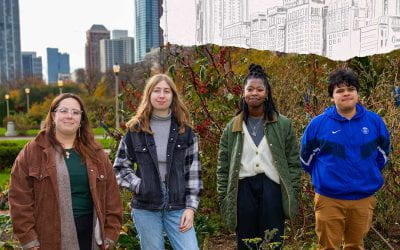Tomorrow’s Health Care Leaders
InnovationBy 2029, the health care industry is expected to add 2.4 million new jobs, more than any other field, according to the U.S. Bureau of Labor Statistics. These major gains come as the U.S. population is growing older and more diverse.

Masked Roosevelt University students working in the chemistry labs.
The new College of Science, Health and Pharmacy (CSHP) at Roosevelt University will help students fill these expanding roles as socially conscious and compassionate researchers, health care providers and experts.
Led by Dean Melissa Hogan and Co-Dean Kelly Wentz-Hunter, both long-time educators and administrators at Roosevelt, the college debuts as the pandemic brings new levels of attention to health care and essential workers across the country.
New and stronger programs in health science
The College of Science, Health and Pharmacy brings together 16 Roosevelt programs, including allied health, biology, pharmacy, and a broad array of other science and health majors and minors.
The college builds on the success of the three-year Doctor of Pharmacy program, which welcomed its first class of students in 2011. The program sets students up for a strong launch to their career with comprehensive board preparation, boasting a 95% average post-graduation employment rate. Roosevelt students pass their boards on the first time often at or above the national passing rate.
“Our success is the result of the incredible commitment of our faculty and staff,” Dr. Hogan said on the University podcast. She and Dr. Wentz-Hunter joined Ali on And Justice for All to discuss the new college. “I’ve never worked with a more dedicated group of individuals, and they’re all here for the same reason: they want to support students.”
Dr. Hogan has served as the dean of the College of Pharmacy since 2016. She joined the Roosevelt faculty in 2012 with 17 years of experience in pharmacy education. She added, “I’m really excited to be part of this new college structure, to work together with Dr. Wentz-Hunter and all of our faculty and staff to bring together these robust offerings in science and health care.”
Dr. Wentz-Hunter joined the Roosevelt faculty in 2006 and has served as a professor of biology and chair of the Biological, Physical and Health Sciences department.
Under her leadership, the master’s of biomedical science program has become a successful bridge between undergraduate and professional health programs — such as medical, dental and pharmacy school — for aspiring health care leaders. Students that changed their goals after earning their bachelor’s degree, or who went through personal struggles, that affected their GPA, can prove they can handle a rigorous science program through the master’s degree.
“We have so many students that have not been given a chance or given opportunities elsewhere,” said Dr. Wentz-Hunter. “These are the type of students that we welcome at Roosevelt and that are going to change the landscape of health care.”
Students can finish the master’s in biomedical science degree in nine to twelve months, building a science-intensive foundation for the next stage of their careers.
Recent graduate accomplishments
- Lauren Karnesky (MA Biomedical Sciences, ’17) is earning an MSN degree program in the pediatric nurse practitioner/primary care specialty at the Vanderbilt University School of Nursing.
- Natasha Subbarao (MA Biomedical Sciences, ’19) has matriculated to the Kansas City University of Medicine and Bioscience College of Osteopathic Medicine.
- Isaac Jarava (MA Biomedical Sciences, ’19) and classmate Brenda Guillen will graduate from the University of Illinois at Chicago College of Medicine in 2024.
The integration with Robert Morris University Illinois also brought new health career programs, including health and wellness as well as a strong accelerated nursing program. The deans hope to build on the program’s success with a graduate nursing degree.
Nursing alumna Natalie Erbes (BS ’20) had planned to stay an extra quarter at RMUI so she could compete in cheerleading nationals. The pandemic scrapped the competition and threw her directly into the front lines of patient care at Northwestern Memorial Hospital. Erbes says that, thanks to the nursing program, she felt comfortable making the transition to her new role.
“There’s a couple of us working from my class and we all feel the same amount of preparedness,” she said. “I think they really set us up for success.”
Dr. Hogan and Dr. Wentz-Hunter plan to partner with area health care systems so the college can develop new programs around the skills employers want most. They hope to expand certifications to help working health care providers pivot or grow in their careers.
“There’s a couple of us working from my class and we all feel the same amount of preparedness. They really set us up for success.”
— Natalie Erbes (BS Nursing, ’20)
Cross-program collaborations
By housing all of Roosevelt’s science and health programs under one umbrella, the new college aims to make it easier for students to find research opportunities, access resources and navigate their options in the health care field.
The new college will be home to new, cross-disciplinary programs that make the most of faculty expertise across colleges. In the 3+3 program, students like Christian Lazaro-Marshall have a direct path from a bachelor’s in biology to a doctorate in pharmacy.
Lazaro-Marshall made the leap into the doctoral program after working with Dr. Onajole on his organic chemistry courses and getting his advice on his successful application. The program, which takes six years to complete, will make it easier for undergraduates to explore potential careers in pharmacy and make the transition to graduate school.

Tanya Ghannam
In the new dual PharmD and MBA program, pharmacy students can earn both degrees in just four years. Tanya Ghannam applied to the program after years of working in health care, witnessing the personal impact that pharmacists can have on their communities. As a 2020-21 Schweitzer Fellow, she’s in the midst of organizing educational webinars and basic wellness screenings for the refugee community in Chicago’s southwest suburbs.
“I know that I have the foundation for a competitive clinical career in any field of pharmacy,” said Ghannam. “The relationships I’ve made throughout my career at Roosevelt will undoubtedly serve as a key to my success.”
“I know that I have the foundation for a competitive clinical career
in any field of pharmacy.”
— Tanya Ghannam, PharmD/MBA, ’21
Bridging health care disparities
Health care disparities, or preventable differences in how often certain groups become sick or injured, only grew deeper during the pandemic. Federal data shows that Black and Latinx people are three times more likely to contract COVID-19 in the United States, and twice as likely to die from the virus.
Many factors go into health disparities, including access to healthy food and health care providers, clean air and water, and insurance coverage. Health care provider bias can also prevent patients from getting the care they need and lead to dangerous outcomes.
“In addition to recruiting and teaching underrepresented students, we’re very careful about how we spend our valuable resources within the college,” said Dr. Hogan. “We place clinical faculty in health care organizations that serve a significant portion of underserved patients. It’s the right thing to do, and we want our students trained in these settings.”
The College of Science, Health and Pharmacy will prepare students in every arm of the industry to provide culturally competent care. In 2017, Roosevelt won a five-year, $1 million grant from the Howard Hughes Medical Institute as part of its Inclusive Excellence Initiative. The funds support outreach services, cross-cultural learning experiences, and undergraduate mentoring for underrepresented students.
This fall, Roosevelt received a five-year, $1.3 million Student Support Services grant from the Department of Education that will fund programs for first-generation and low-income STEM students. With free academic tutoring, advising and mentoring, the science and math students will have the extra support they need to thrive during their time at Roosevelt.
The funds support outreach services, cross-cultural learning experiences, and undergraduate mentoring to give underrepresented students the support they need to thrive.
“Right now, as we look at our health care providers, they don’t reflect the populations that they serve,” said Dr. Wentz-Hunter. “Part of the mission of Roosevelt is making opportunities for all, and we want to emulate that mission so that we have health care providers that match our population.”
More in this section
unexcused absence
Some of life’s most important lessons cannot be taught inside the four walls of a classroom. Matthew Beardmore’s travel has forced him to reassess how he thinks about work, family, politics, injustice and many other issues. He’s no longer tied to the beliefs of where he grew up.
traveling while home: self-discovery through the local
How can you make the long trip home if you don’t actually leave there? A partnership between Roosevelt University’s Honors Program and Chicago Architecture Center asks students to experience space and place as sites for action—not simply places we passively inhabit.
creating a new travel niche while wandering the globe
In early 2011, Sahara Rose De Vore bought a one-way ticket to Costa Rica. Over the next 10 years, she explored 84 countries. The self-discovery she experienced inspired her to launch two successful businesses—both helping others discover the benefits of travel.



